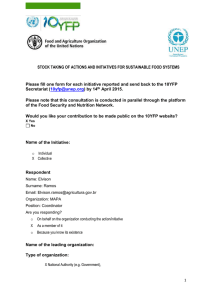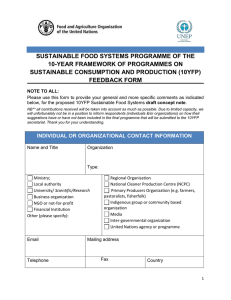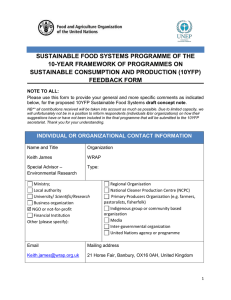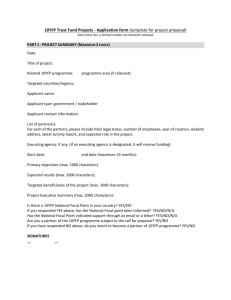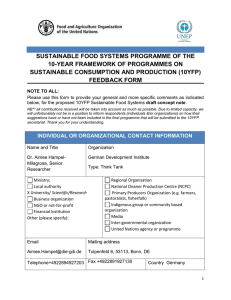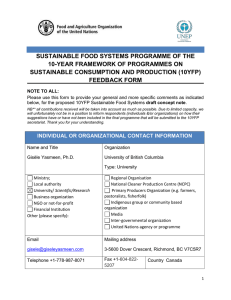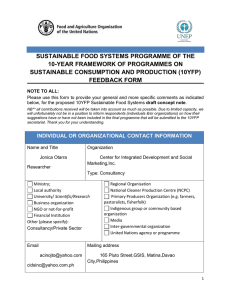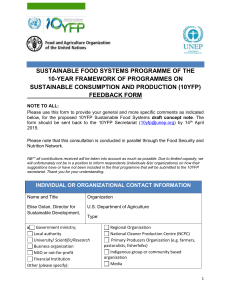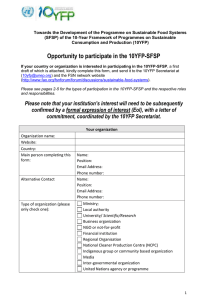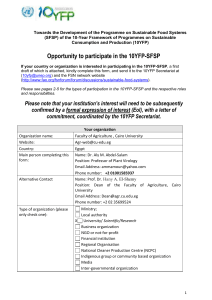Towards the Development of the Programme on Sustainable Food Systems
advertisement
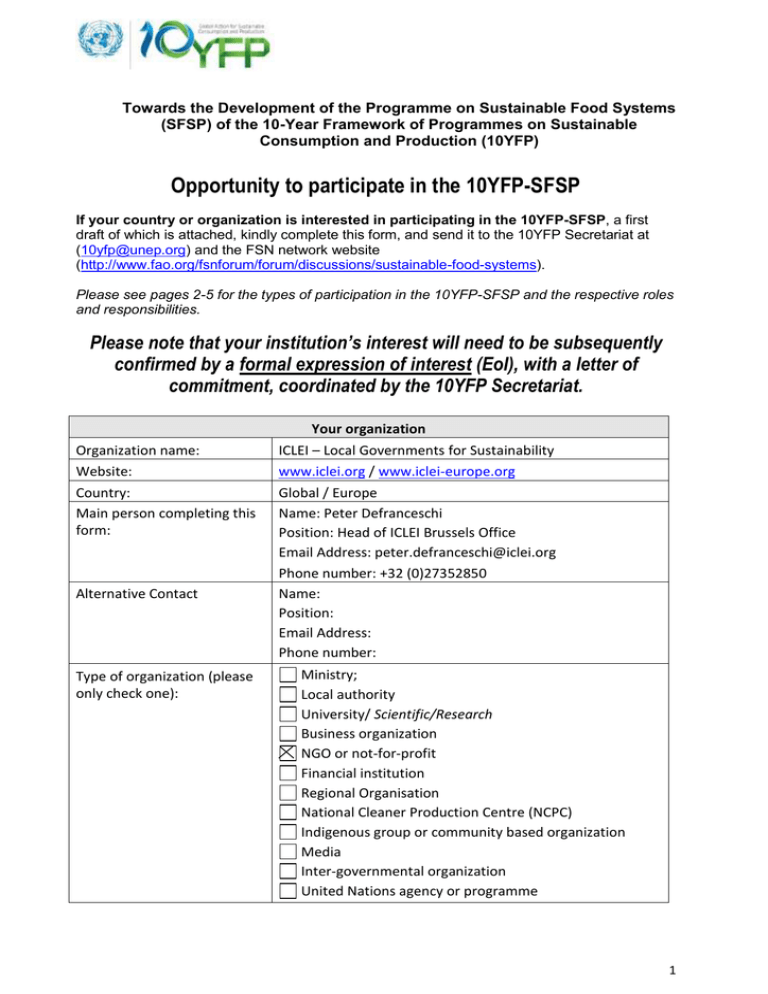
Towards the Development of the Programme on Sustainable Food Systems (SFSP) of the 10-Year Framework of Programmes on Sustainable Consumption and Production (10YFP) Opportunity to participate in the 10YFP-SFSP If your country or organization is interested in participating in the 10YFP-SFSP, a first draft of which is attached, kindly complete this form, and send it to the 10YFP Secretariat at (10yfp@unep.org) and the FSN network website (http://www.fao.org/fsnforum/forum/discussions/sustainable-food-systems). Please see pages 2-5 for the types of participation in the 10YFP-SFSP and the respective roles and responsibilities. Please note that your institution’s interest will need to be subsequently confirmed by a formal expression of interest (EoI), with a letter of commitment, coordinated by the 10YFP Secretariat. Your organization Organization name: ICLEI – Local Governments for Sustainability Website: www.iclei.org / www.iclei-europe.org Country: Main person completing this form: Global / Europe Name: Peter Defranceschi Position: Head of ICLEI Brussels Office Email Address: peter.defranceschi@iclei.org Phone number: +32 (0)27352850 Name: Position: Email Address: Phone number: Alternative Contact Type of organization (please only check one): Ministry; Local authority University/ Scientific/Research Business organization NGO or not-for-profit Financial institution Regional Organisation National Cleaner Production Centre (NCPC) Indigenous group or community based organization Media Inter-governmental organization United Nations agency or programme 1 Brief description of your organization (please include objective and main areas of interest) Other (please specify): ICLEI is the world’s leading network of over 1,000 cities, towns and metropolises committed to building a sustainable future. By helping our Members to make their cities sustainable, low-carbon, resilient, biodiverse, resourceefficient, healthy and happy, with a green economy and smart infrastructure, we impact over 20% of the global population. Please specify your proposed participation in the 10YFP-SFSP Type of proposed Lead actor participation Co-Lead actor Member of Multi-stakeholder Advisory Committee (MAC) Coordinator of a programme work area Partner What is your main motivation to be part of the 10YFP-SFSP? Please explain in a few paragraphs - - Increasing interest of cities (members) in sustainable food systems worldwide; ICLEI has been working on all issues related to sustainable food systems at urban level (integrated approach): urban agriculture, resilience, biodiversity, climate change, sustainable public procurement etc. Together with the Foundation-International Network on Urban Agriculture and Food Systems (RUAF), ICLEI is running the CityFood Network. CityFood is a community of cities with the ambition and commitment to establish policies, programs, plans and projects on sustainable and resilient urban food systems, including appropriate approaches to urban food production. (see also below) How could your country or organization contribute to the development and implementation of the 10YFP-SFSP? 1) Through the CityFood Network whose purpose is to: - strengthen, profile and connect leading cities worldwide to facilitate peer-to-peer cooperation, exchange and mutual learning on good practices, practical guidelines and recommendations, between the globally most advanced cities and those who wish to initiate respective activities, - take up the notion of the Urban Food Policy Pact and to provide a framework for action and institutionalized cooperation. - to provide expertise and services to network participants which support implementation of their commitments to improving city food systems 2) Through various thematic work streams related to sustainable food systems such as sustainable public procurement (ICLEI co-lead in 10YFP SPP Programme), biodiversity (ICLEI’s Local Action on Biodiversity programme), climate change adaptation & 2 mitigation, resilience, city-region link etc. 3) Through targeted events at global and European level. 4) In particular, ICLEI could contribute through: - - - Customized advisory workshops: Workshops organized in participating cities on improving their local food system through planning, policy, city-led multi stakeholder cooperation and other means targeted to the participant’s local needs. Pool of experts: Establishment of a pool of experts from private sector, universities, consultancies, funding agencies etc. to provide network participants with partnership contacts to implement solutions and meet their targets. Knowledge management: Compiling case studies on good practices and policies to provide expertise Please provide a brief description of your efforts in the field of sustainable food systems. - Organised several international, high level events on sustainable food systems (e.g. Urban Agriculture Strategy Meeting ‘Drivers for sustainable urban food production’, Bonn 28/5/2014, and included specific related sessions in other events in the past years. - Announced in 2013 (Resilient Cities conference, Bonn), the CityFood Network has been officially launched on 11 April 2015 at the ICLEI World Congress 2015 (see objectives above). Lead initiative: Mustafa Tunç Soyer, Mayor, Seferihisar, Turkey; Hae-sik Lee, Mayor, Gangdong-gu, South Korea; Almada, Portugal - In the frame of CityFood developed guidance including good practice examples (“Cityfood: Linking Cities on Urban Agriculture and Urban Food Systems”, 2013) - ICLEI has been working through its sustainable procurement programme on sustainable food systems for over 15 years, in particular - by developing guidance on criteria for sustainable food procurement; - Other relevant ICLEI programmes and activities, such as Local Action on Biodiversity, Resilient Cities, work on the energy-water-food nexus have been addressing sustainable food systems; As the representative of my organization/government, I confirm that the information is correct and true. Date: 27/4/2015 Name: Peter Defranceschi 3 Before expressing any interest, please, kindly read carefully the “Guidance document on the 10YFP PROGRAMMES : Criteria, structure and steps to develop and operationalize them”1, which explains the objective and activities of the programme, the different roles available and benefits and responsibilities associated with them. Immediately below you will find a summary of the role and responsibilities of the Lead and Co-leads, Multi-stakeholder Advisory Committee (MAC) members, and Partners of the programme. These will be set out in more detail in the formal Expression of Interest form that you will receive subsequently from the 10YFP Secretariat. ____________________________________________________________________ Role and Responsibilities of the Lead and Co-leads of a 10YFP Programme: Support the overall coordination of the programme implementation and proactively fundraise for the programme; Provide financial and/or in-kind contribution, including dedicated staff in support of a “Coordination Desk” (each programme will need a minimum of 1-2 full time staff to start operating); Jointly supervise the work of the Coordination Desk (whose tasks could be executed from different geographical locations); Chair and co-chair the MAC meetings, facilitate the decision-making within the Committee and support its activities, including those related to securing support from the 10YFP Trust Fund; Act as liaison and focal point for contacts between the Secretariat and the SFS programme and all its partners; Report on progress and outcomes as required, including through the preparation of an annual report for the 10YFP Secretariat to convey to the Board and to be included in the 10YFP report to ECOSOC. Criteria for lead and co-leads: Any government from any UN member state relevant regional or national organizations, international organizations (including UN agencies), industry or business organizations, non-governmental/civil society organizations or academic institutions, or any other entity that supports the goals of the 10YFP (www.unep.org/10yfp) and agrees to work towards them can apply to become a lead or a co-lead of a specific 10YFP programme. The lead and co-lead(s) should: • demonstrate an active or leading role in supporting the shift towards sustainable consumption and production patterns at national and/or regional levels; • provide resources (including in-kind contributions or expertise) for coordination 1 Document available at: www.unep.org/10yfp and http://www.unep.org/10yfp/Portals/50150/Guidance_Doc_10YFP_Programme%20development_1_V1_March14.pdf 4 and implementation of activities under this programme; and • ensure minimum commitment to remain engaged for at least four years. Role and Responsibilities of the MAC of a 10YFP Programme: review goals, objectives and measures of success, based on the initial programme’s work plan, with the aim of providing guidance on progress towards more sustainable consumption and production patterns; review on the performance and evolution of the programme’s work plan, advise on and proactively engage new partners, initiatives and activities in the line with the objectives of the programme, as well as in response to emerging demand and priorities; enhance synergies and cooperation among stakeholders within the programme as well as with other programmes of the 10YFP; propose projects and/or activities for implementation in accordance with the work plan of the programme; provide guidance to the 10YFP Secretariat for the elaboration of calls for proposals for the 10YFP Trust Fund, in the area of the programme, and to screen and short list proposals received based on established criteria; Criteria for the members of the Multi-stakeholder Advisory Committee Any government from any UN member state relevant regional or international organizations, industry or business organizations, non-governmental/civil society organizations or academic institutions, or any other entity that supports the goals of the 10YFP and agrees to work towards them can apply to become a member of the MAC of a specific programme. The composition of the MAC ideally could reflect a diversity of partner categories and geographic regions, in this context, members of the MAC should: demonstrate strong interest and/or recognized expertise and experience, if possible reflected in policies and actions, in the area of the programme; have played an active or leading role in supporting the sustainable consumption and production and/or sustainable development agenda at the national and/or regional levels. Role of Coordinators of the Programme Work Areas Coordinators of a programme work area are not necessarily members of the MultiStakeholder Advisory Committee, but can take an active role in coordinating one or more of the programme work areas. When coordinating a work area of the programme, they are responsible for ensuring that the related activities are delivered in an inclusive and effective manner. They bring their expertise, expand their networks and partnerships, build synergies and help scale-up and replicate best practices on SCP at all levels. 5 ____________________________________________________________________ Role of Partners Any stakeholder supporting implementation and/or benefiting from the activities of the programme could be a partner of a programme. Those activities include workshops, trainings, making use and supporting dissemination of the materials, including policy and capacity-building tools and reports produced by the programme. Partners do not necessarily need to provide technical and/or financial support. Thank you very much for your time., 6
